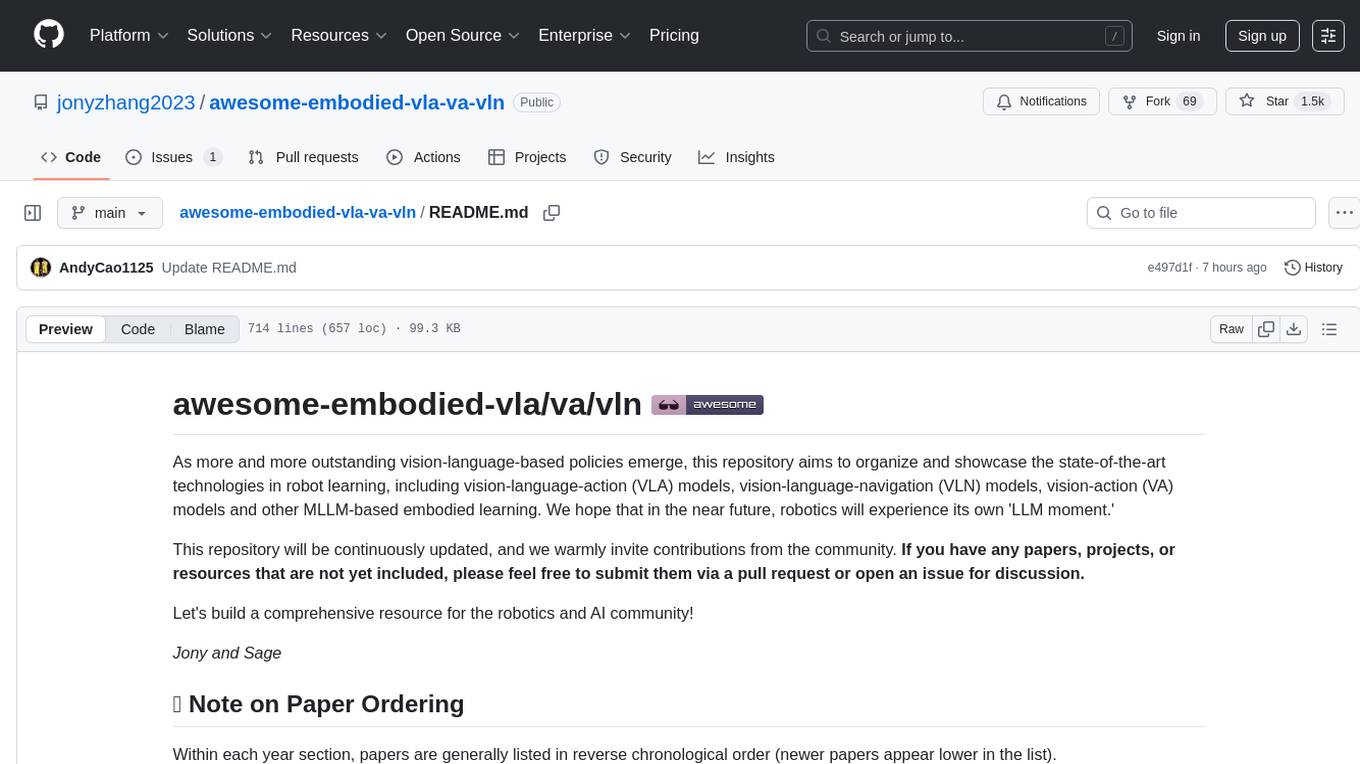
do-research-in-AI
A repository of useful research/skill-upgrading talks or acticles in NLP/CV/AI Area (in Chinese).
Stars: 61
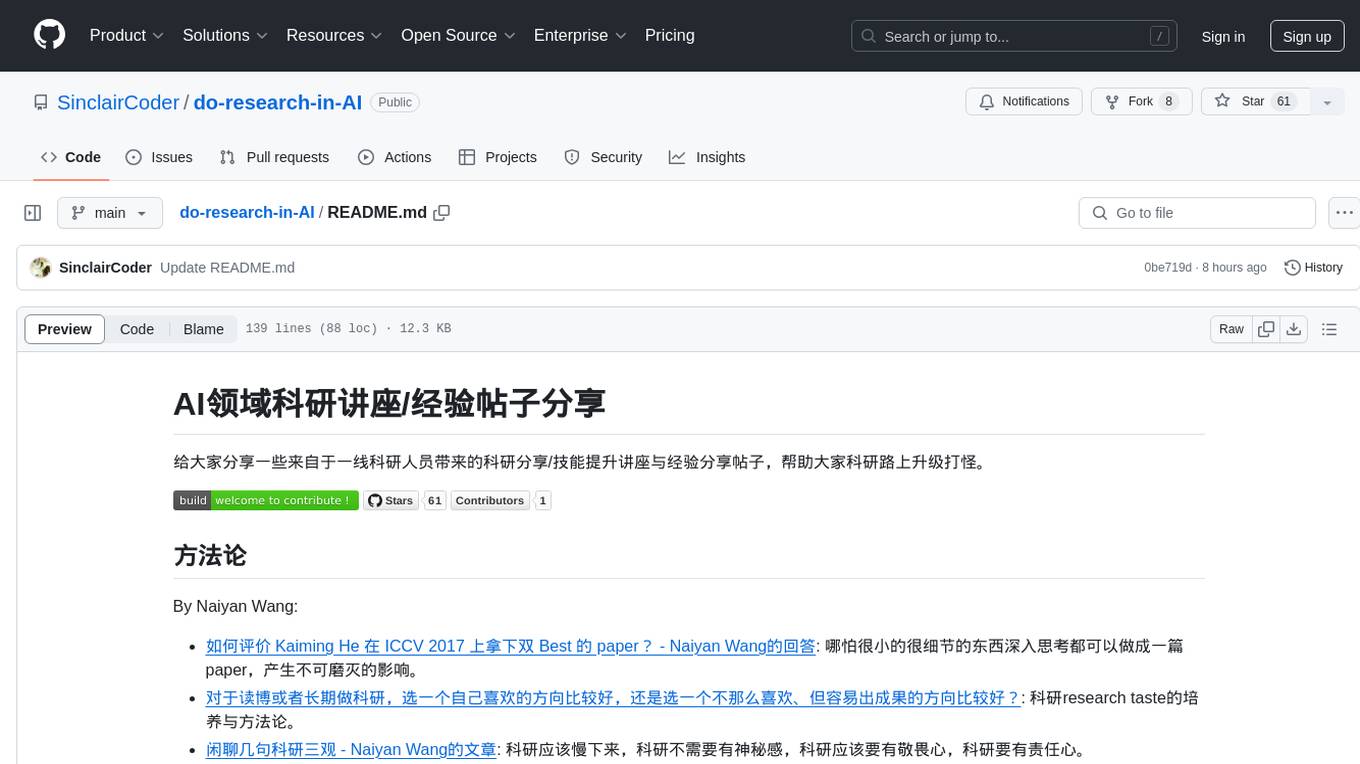
This repository is a collection of research lectures and experience sharing posts from frontline researchers in the field of AI. It aims to help individuals upgrade their research skills and knowledge through insightful talks and experiences shared by experts. The content covers various topics such as evaluating research papers, choosing research directions, research methodologies, and tips for writing high-quality scientific papers. The repository also includes discussions on academic career paths, research ethics, and the emotional aspects of research work. Overall, it serves as a valuable resource for individuals interested in advancing their research capabilities in the field of AI.
README:
给大家分享一些来自于一线科研人员带来的科研分享/技能提升讲座与经验分享帖子,帮助大家科研路上升级打怪。
By Naiyan Wang:
- 如何评价 Kaiming He 在 ICCV 2017 上拿下双 Best 的 paper? - Naiyan Wang的回答: 哪怕很小的很细节的东西深入思考都可以做成一篇paper,产生不可磨灭的影响。
- 对于读博或者长期做科研,选一个自己喜欢的方向比较好,还是选一个不那么喜欢、但容易出成果的方向比较好?: 科研research taste的培养与方法论。
- 闲聊几句科研三观 - Naiyan Wang的文章: 科研应该慢下来,科研不需要有神秘感,科研应该要有敬畏心,科研要有责任心。
- 老文重发:我的PhD总结暨关于PhD的十个问题
-
[x] 2021智源大会 科研技能提升讲座
-
[x] CCL 2020 学生研讨会
-
[x] 初入科研领域,如何正确做科研?丨智源论坛·青年学者研讨会 北大李夏、清华大学游凯超、北理工魏恺轩、清华大学于是担任嘉宾,交流论文写作、平衡科研与生活、和导师合作做科研等话题。
北京智源研究院学者说栏目:
- [x] 北京智源采访:唐杰学术生涯的两条核心精神:专注+成为第一 清华大学教授唐杰:学术生涯的两条核心精神 1.专注,专注,再专注 2.做事情追求极致
- [x] 北京智源采访:唐杰教授:从学生到学者的四个阶段 清华大学教授唐杰,谈从学生到学者的四个阶段 阶段一:在引路人的带领下,把一件事情做到最好; 阶段二:想一个Idea,在被告知哪些不能做后,把能做的部分做到极致; 阶段三:完全独立地想一个Idea,并独立地做完、做好; 阶段四:能够带着第一阶段的人,引导他把一件事情做好。
- [x] 北京智源采访:赵鑫:研究生正确的科研道路应该是什么? 快速入门科研,正确的道路是什么?中国人民大学高瓴人工智能学院,长聘副教授赵鑫认为,关键在于,如何从宽泛的人工智能技术,缩到一个可做的一个题目。有四个步骤:打基础、读论文、定方向、锁定研究课题。
- [x] 北京智源采访:赵鑫:本科生存在的最大问题是什么? 本科生存在的最大问题是什么?想得太多,做的太少。一个人的精力是有限的,认准一个事情,沉下心来,认真把它做出来,无论学业,还是事业,必将成为人生赢家。
- [x] 北京智源采访:刘知远:博士生的三种境界 清华大学计算机系副教授刘知远,谈博士生的三种境界 境界一:能够解决开放问题——面对一片未知,找出一条路。 境界二:具备科研方向感——知道哪些问题是重要且能被解决的。 境界三:负有领域责任感——对领域未来发展,负有责任感;领域兴亡,匹夫有责。
- [x] 北京智源采访:沈华伟:优秀学者,应该是什么样的? 优秀学者的三层境界: 1、解决问题,为领域发展做贡献; 2、传道受业,带起一批人; 3、突破自我,服务社会。
- [ ] 2021 CVPR 论文分享会 | Panel Discussion:与学术新星畅谈计算机视觉科研之"路" 主持人:王井东 Panel嘉宾:潘金山,宋舒然,孙晨,吴佳俊,汤思宇,朱俊彦,张祥雨
沈向洋博士的分享:
- [ ] 我的科研生涯 从博士到博导-张弘扬
- [ ] 多语言学习:如何从兴趣到科研-胡俊杰
最近看了一个系列,@王晋东不在家的 研究生活九帖
- [x] ResearchGo:研究生活第一帖——文献检索与管理
- [x] ResearchGo:研究生活第二贴——文献阅读
- [x] ResearchGo:研究生活第三帖——阅读辅助
- [x] ResearchGo:研究生活第四帖——文献调研
- [x] ResearchGo:研究生活第五帖——文献综述
- [x] ResearchGo:研究生活第六帖——如何讲论文
- [x] ResearchGo:研究生活第七帖——专利检索与申请
- [x] ResearchGo:研究生活第八帖——写论文、做PPT、写文档必备工具集锦
- [x] ResearchGo: 研究生活第九帖——当我们在读论文时,我们在读些什么?
赵鑫老师的分享,感觉启发很大
- [x] 赵鑫老师:计算机系本科生开展科研学习的九问九答
- [x] 赵鑫老师:研究生的早期科研之路
- [x] 赵鑫老师:比较简短的博士鸡汤和避坑分享
- [ ] 赵鑫老师:庖丁解牛剖析国际学术论文写作的快速入门
-
[ ] 周志华教授:如何做研究与写论文
-
[x] 李正华老师的一些感触和思考
-
[x] 如何看待本科生科研?
一些大牛的经历:
看过了很多人的Phd总结,愈发觉得每个Phd都各自有各自的苦难,共同的点是无非是焦虑,科研压力,同龄人压力,经济/家庭压力等等,不同的是每个人情况不一样机遇不一样,大家都是各显神通,于是乎才有了下面这些帖子:
- [x] 李沐:博士这五年
- [x] 陈天奇:机器学习科研的十年
- [ ] Shou Zheng: 计算机视觉 | 哥大读博五年总结(全)
- [x] 前紧后松:清华读博前两年的焦虑与成长
- [ ] 更多请参考:读博总结的总结:整理优质的CS读博(PhD)总结和建议文章
博士修行指导资源汇总帖子:
- [ ] Doing the PhD
- [ ] NLP Phd Gobal Equality
For Tasks:
Click tags to check more tools for each tasksFor Jobs:
Alternative AI tools for do-research-in-AI
Similar Open Source Tools

do-research-in-AI
This repository is a collection of research lectures and experience sharing posts from frontline researchers in the field of AI. It aims to help individuals upgrade their research skills and knowledge through insightful talks and experiences shared by experts. The content covers various topics such as evaluating research papers, choosing research directions, research methodologies, and tips for writing high-quality scientific papers. The repository also includes discussions on academic career paths, research ethics, and the emotional aspects of research work. Overall, it serves as a valuable resource for individuals interested in advancing their research capabilities in the field of AI.
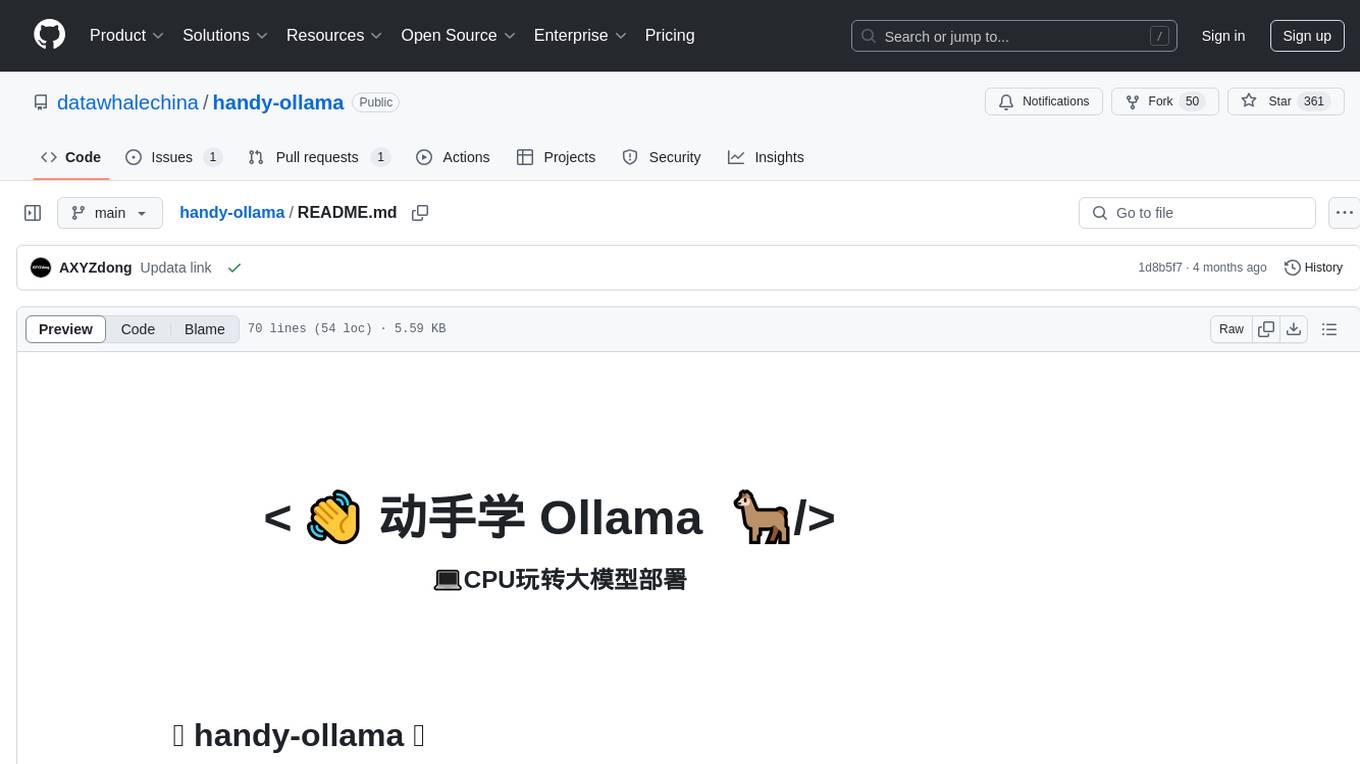
handy-ollama
Handy-Ollama is a tutorial for deploying Ollama with hands-on practice, making the deployment of large language models accessible to everyone. The tutorial covers a wide range of content from basic to advanced usage, providing clear steps and practical tips for beginners and experienced developers to learn Ollama from scratch, deploy large models locally, and develop related applications. It aims to enable users to run large models on consumer-grade hardware, deploy models locally, and manage models securely and reliably.
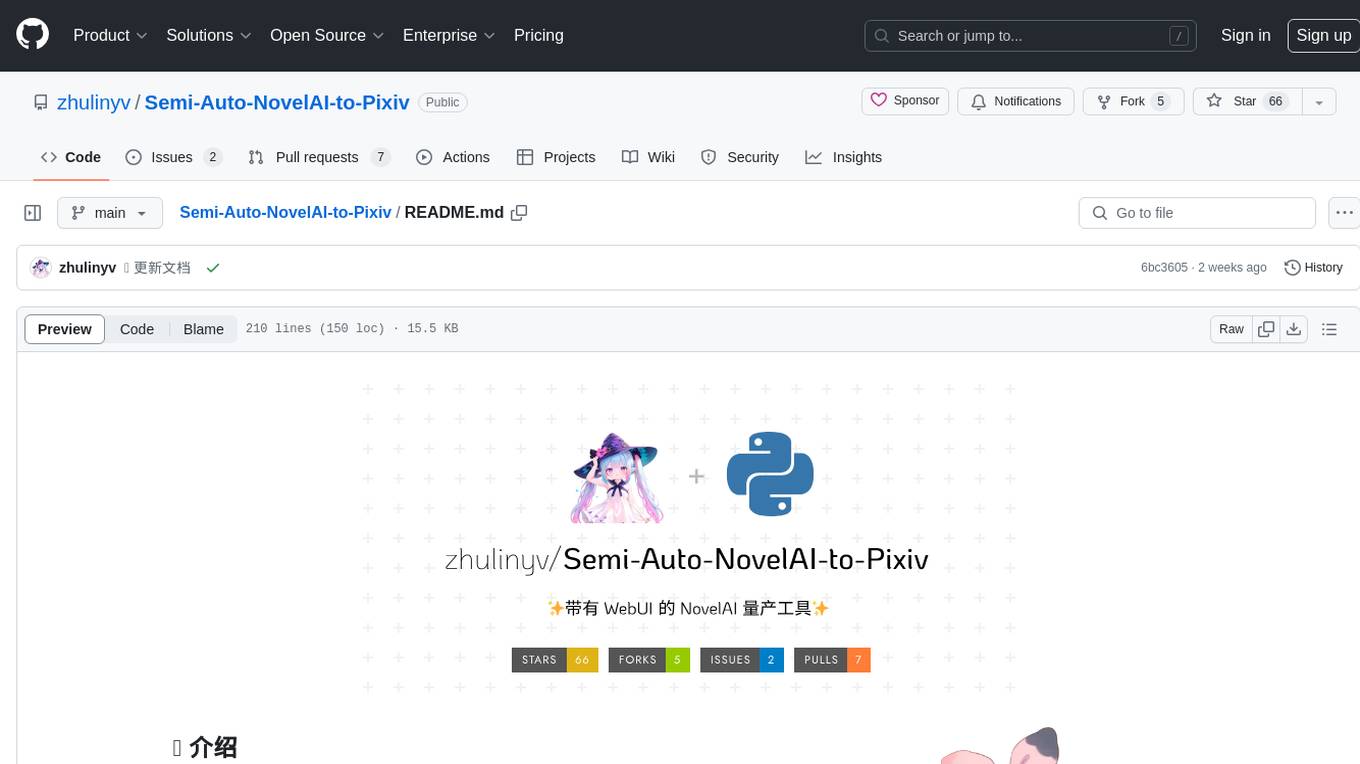
Semi-Auto-NovelAI-to-Pixiv
Semi-Auto-NovelAI-to-Pixiv is a powerful tool that enables batch image generation with NovelAI, along with various other useful features in a super user-friendly interface. It allows users to create images, generate random images, upload images to Pixiv, apply filters, enhance images, add watermarks, and more. The tool also supports video-to-image conversion and various image manipulation tasks. It offers a seamless experience for users looking to automate image processing tasks.
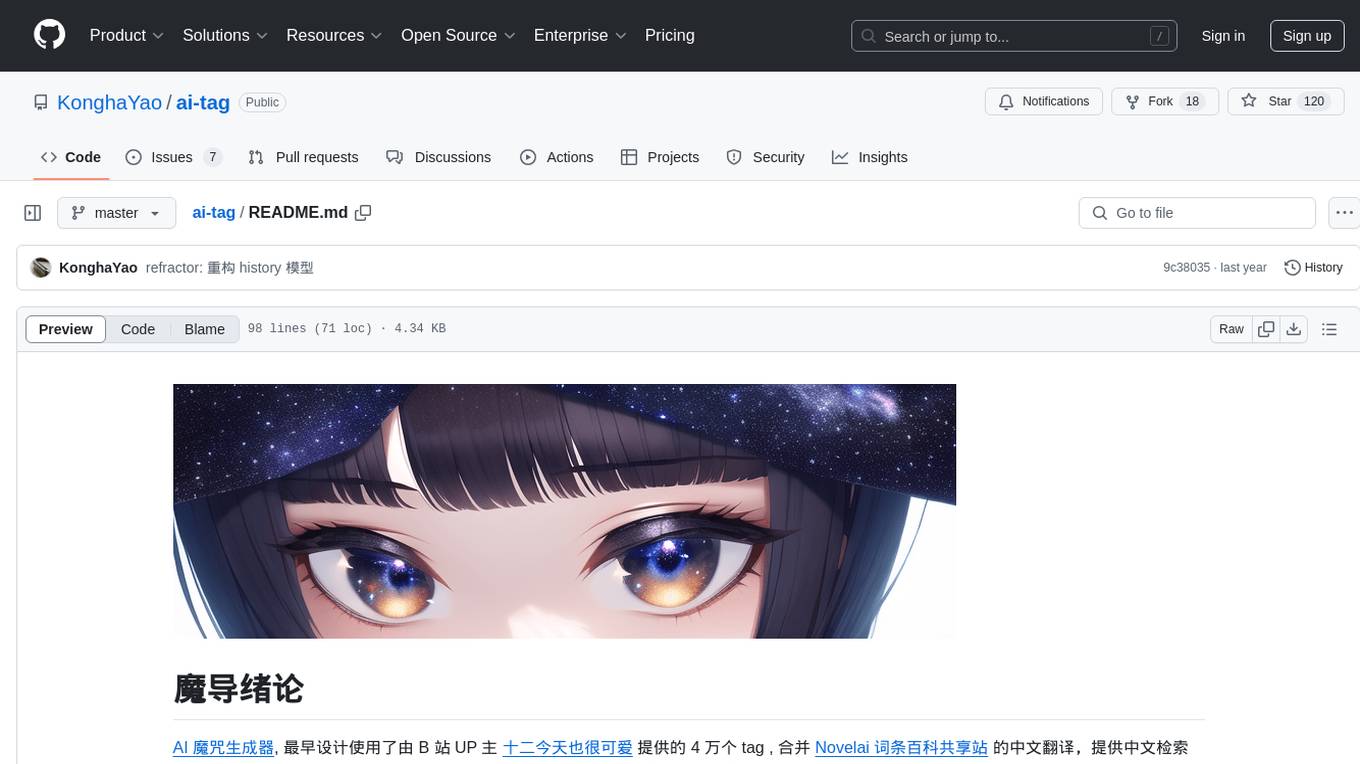
ai-tag
AI tag generator that combines 40,000 tags from Bilibili UP main Twelve Today is also very cute with Chinese translations from Novelai, providing Chinese search and tag generation services. It offers a tag community for magicians to directly copy and generate spells. Always free, no ads, no commercial use. The project includes a pure tag parsing library, independent spell parsing library, tag data repository, and a new gallery page with waterfall flow for viewing community images.

ChatGPT-On-CS
This project is an intelligent dialogue customer service tool based on a large model, which supports access to platforms such as WeChat, Qianniu, Bilibili, Douyin Enterprise, Douyin, Doudian, Weibo chat, Xiaohongshu professional account operation, Xiaohongshu, Zhihu, etc. You can choose GPT3.5/GPT4.0/ Lazy Treasure Box (more platforms will be supported in the future), which can process text, voice and pictures, and access external resources such as operating systems and the Internet through plug-ins, and support enterprise AI applications customized based on their own knowledge base.
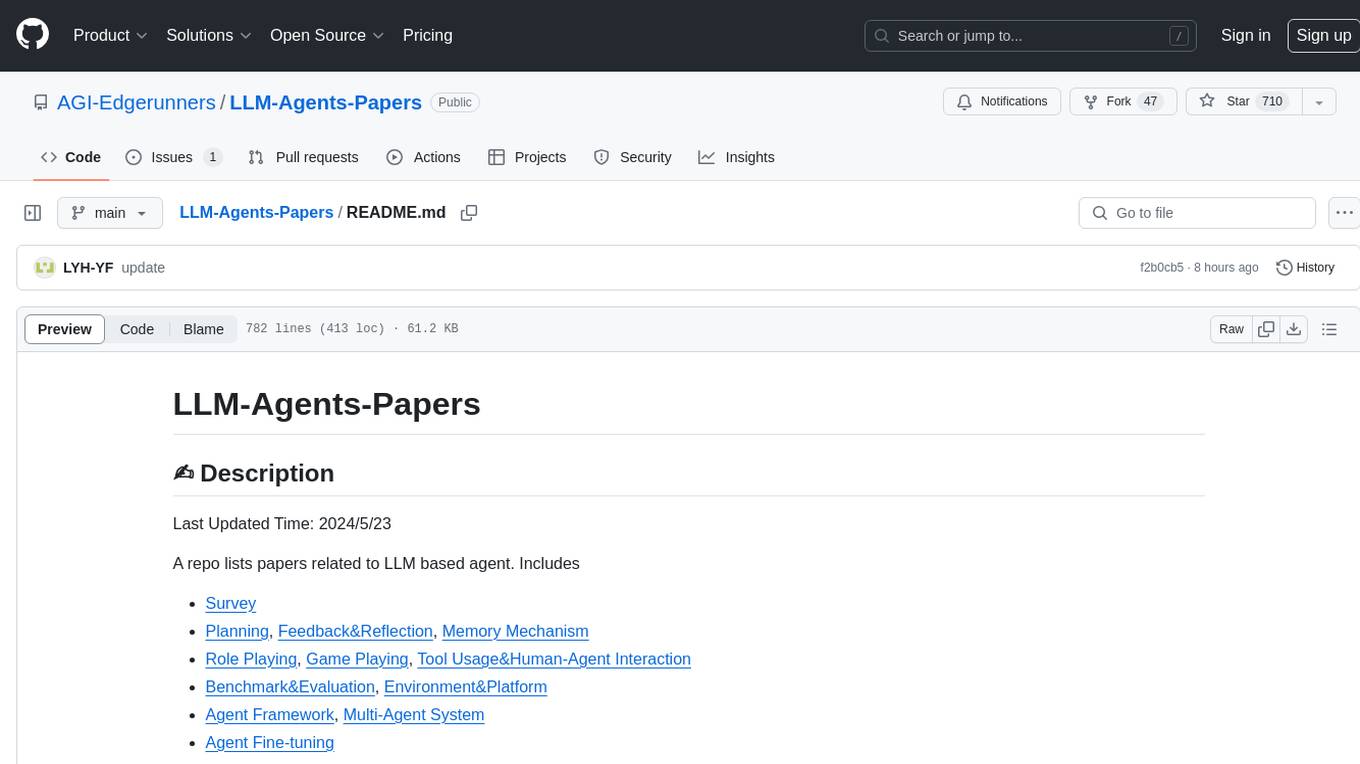
LLM-Agents-Papers
A repository that lists papers related to Large Language Model (LLM) based agents. The repository covers various topics including survey, planning, feedback & reflection, memory mechanism, role playing, game playing, tool usage & human-agent interaction, benchmark & evaluation, environment & platform, agent framework, multi-agent system, and agent fine-tuning. It provides a comprehensive collection of research papers on LLM-based agents, exploring different aspects of AI agent architectures and applications.
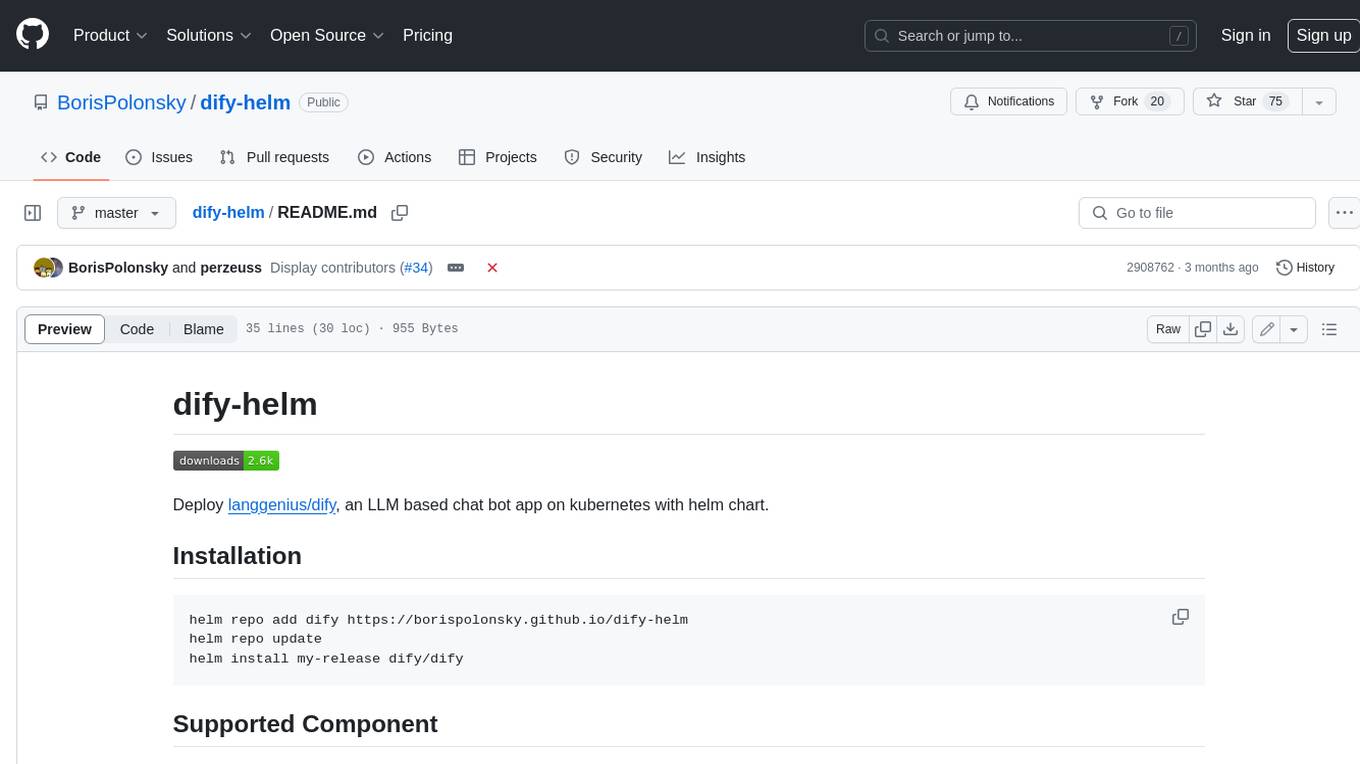
dify-helm
Deploy langgenius/dify, an LLM based chat bot app on kubernetes with helm chart.
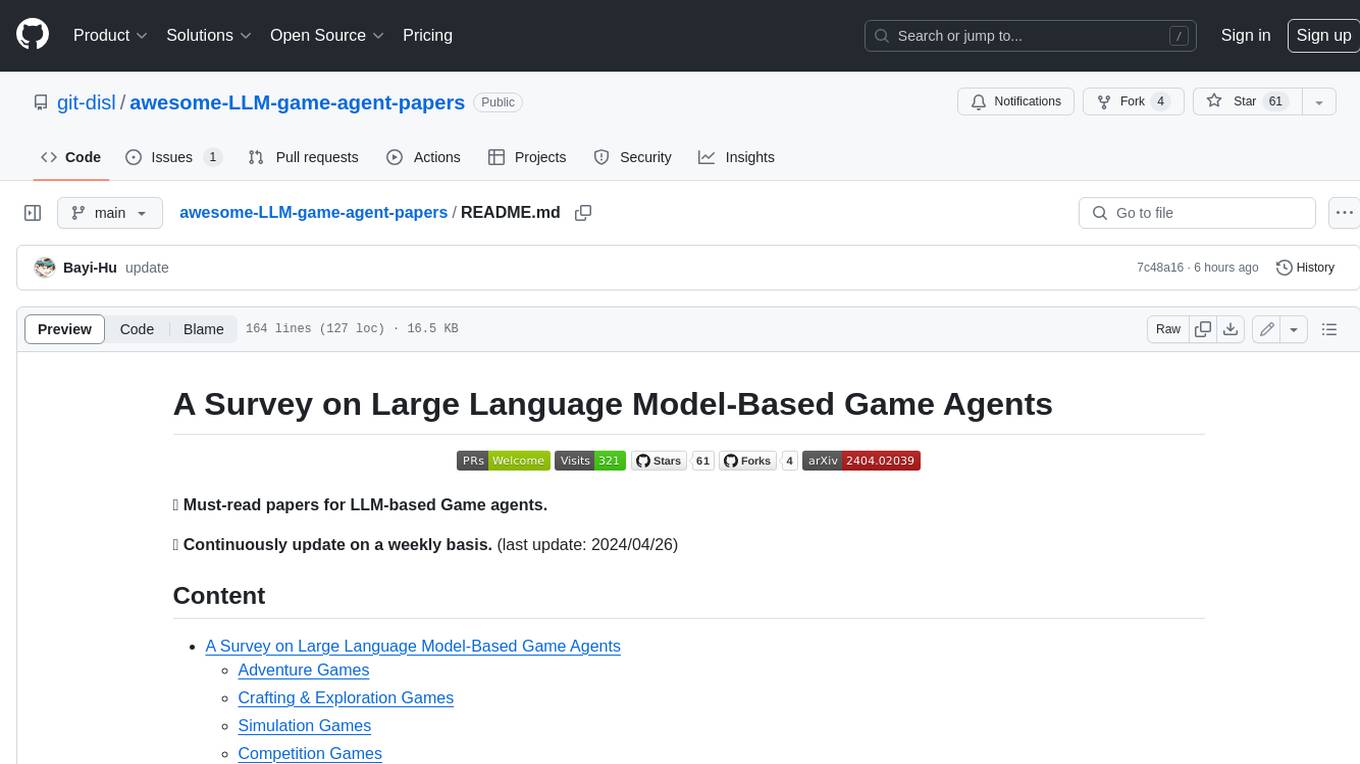
awesome-LLM-game-agent-papers
This repository provides a comprehensive survey of research papers on large language model (LLM)-based game agents. LLMs are powerful AI models that can understand and generate human language, and they have shown great promise for developing intelligent game agents. This survey covers a wide range of topics, including adventure games, crafting and exploration games, simulation games, competition games, cooperation games, communication games, and action games. For each topic, the survey provides an overview of the state-of-the-art research, as well as a discussion of the challenges and opportunities for future work.
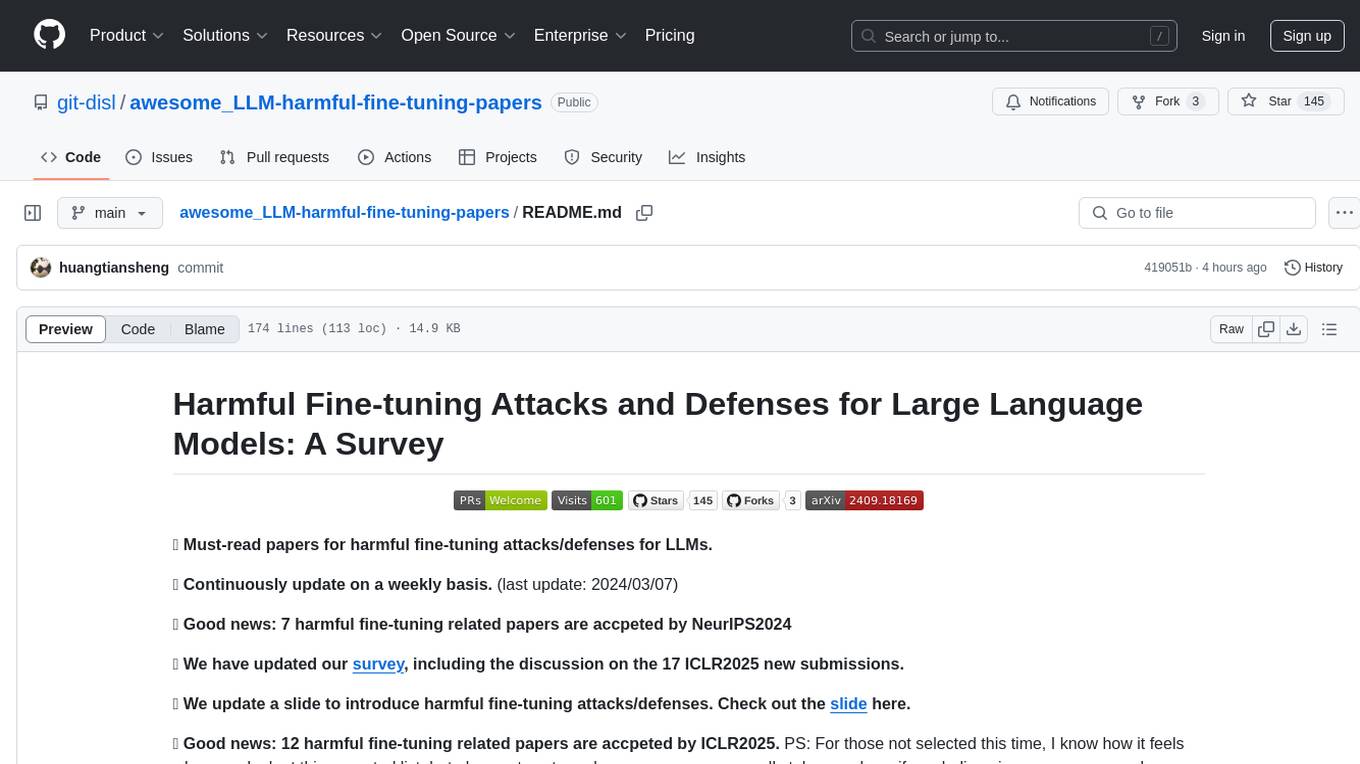
awesome_LLM-harmful-fine-tuning-papers
This repository is a comprehensive survey of harmful fine-tuning attacks and defenses for large language models (LLMs). It provides a curated list of must-read papers on the topic, covering various aspects such as alignment stage defenses, fine-tuning stage defenses, post-fine-tuning stage defenses, mechanical studies, benchmarks, and attacks/defenses for federated fine-tuning. The repository aims to keep researchers updated on the latest developments in the field and offers insights into the vulnerabilities and safeguards related to fine-tuning LLMs.
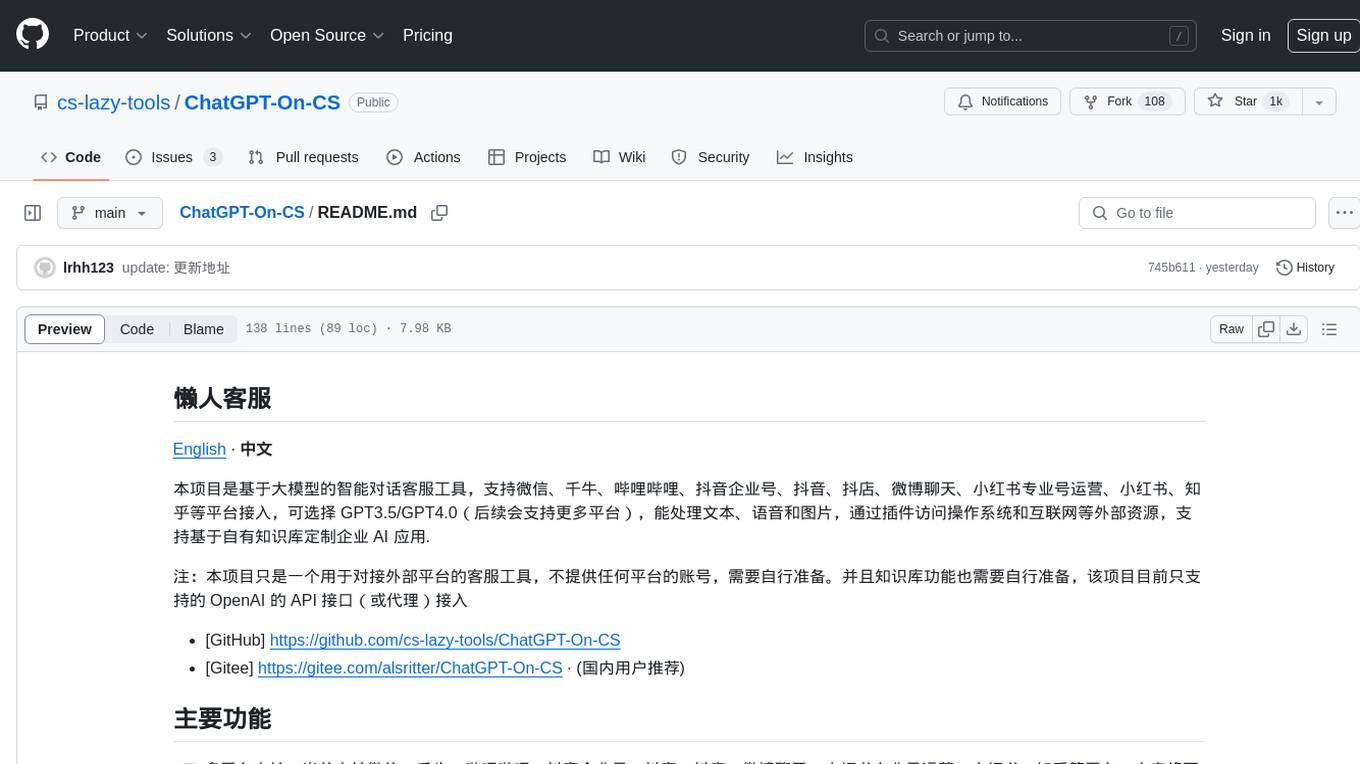
ChatGPT-On-CS
ChatGPT-On-CS is an intelligent chatbot tool based on large models, supporting various platforms like WeChat, Taobao, Bilibili, Douyin, Weibo, and more. It can handle text, voice, and image inputs, access external resources through plugins, and customize enterprise AI applications based on proprietary knowledge bases. Users can set custom replies, utilize ChatGPT interface for intelligent responses, send images and binary files, and create personalized chatbots using knowledge base files. The tool also features platform-specific plugin systems for accessing external resources and supports enterprise AI applications customization.
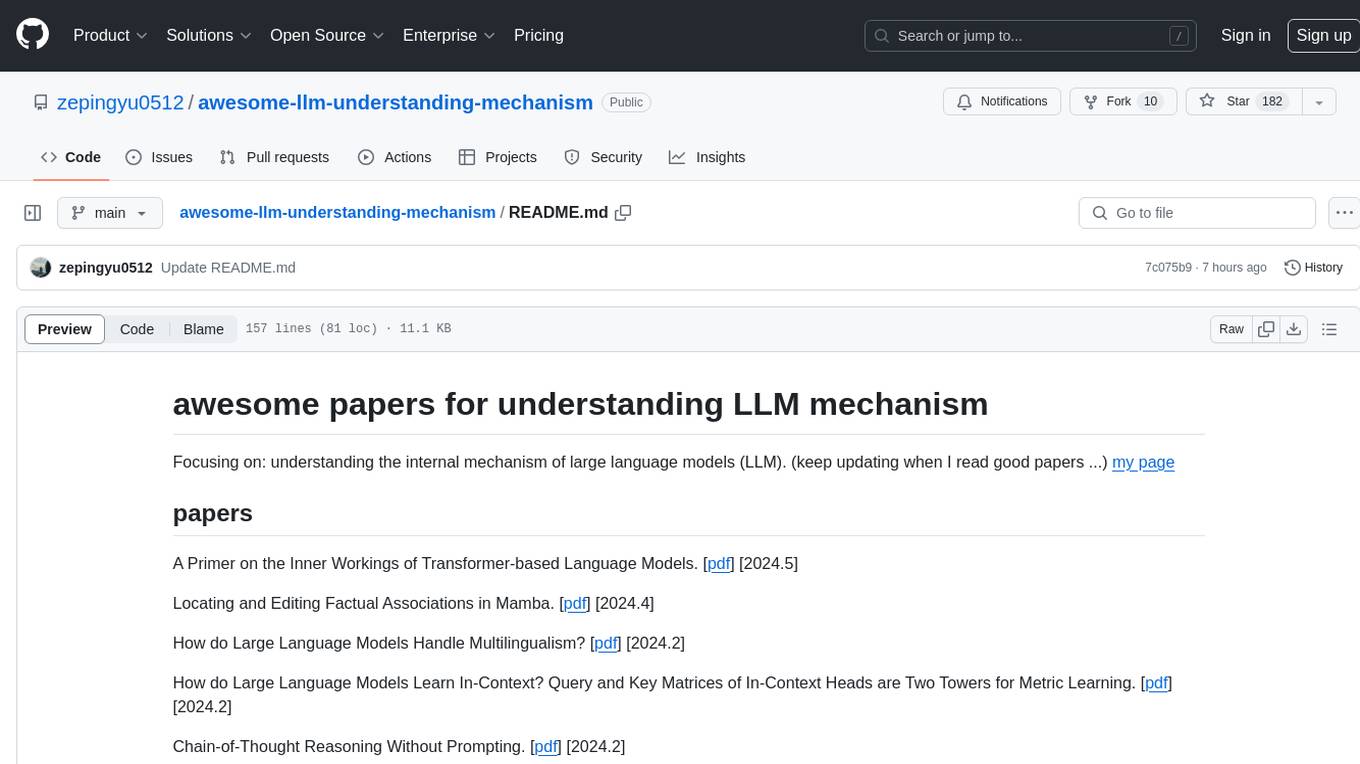
awesome-llm-understanding-mechanism
This repository is a collection of papers focused on understanding the internal mechanism of large language models (LLM). It includes research on topics such as how LLMs handle multilingualism, learn in-context, and handle factual associations. The repository aims to provide insights into the inner workings of transformer-based language models through a curated list of papers and surveys.
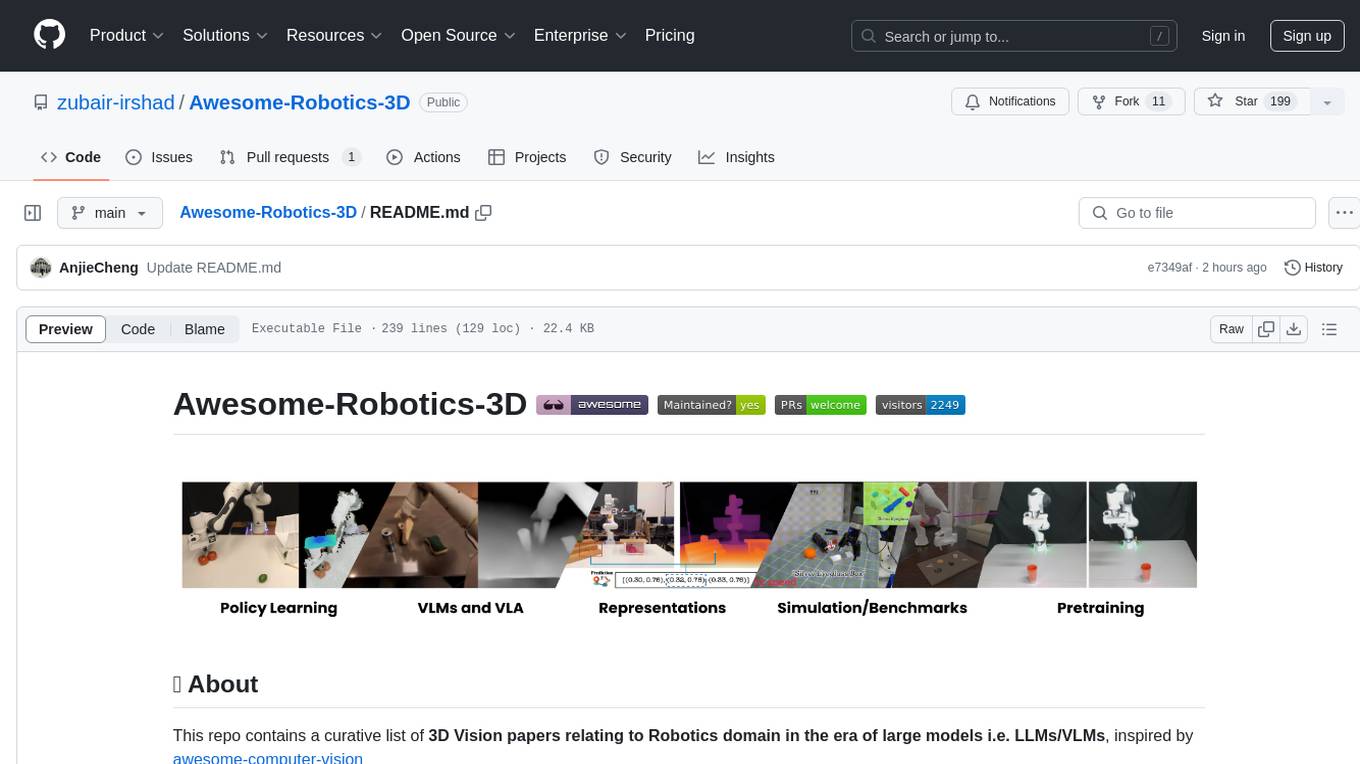
Awesome-Robotics-3D
Awesome-Robotics-3D is a curated list of 3D Vision papers related to Robotics domain, focusing on large models like LLMs/VLMs. It includes papers on Policy Learning, Pretraining, VLM and LLM, Representations, and Simulations, Datasets, and Benchmarks. The repository is maintained by Zubair Irshad and welcomes contributions and suggestions for adding papers. It serves as a valuable resource for researchers and practitioners in the field of Robotics and Computer Vision.
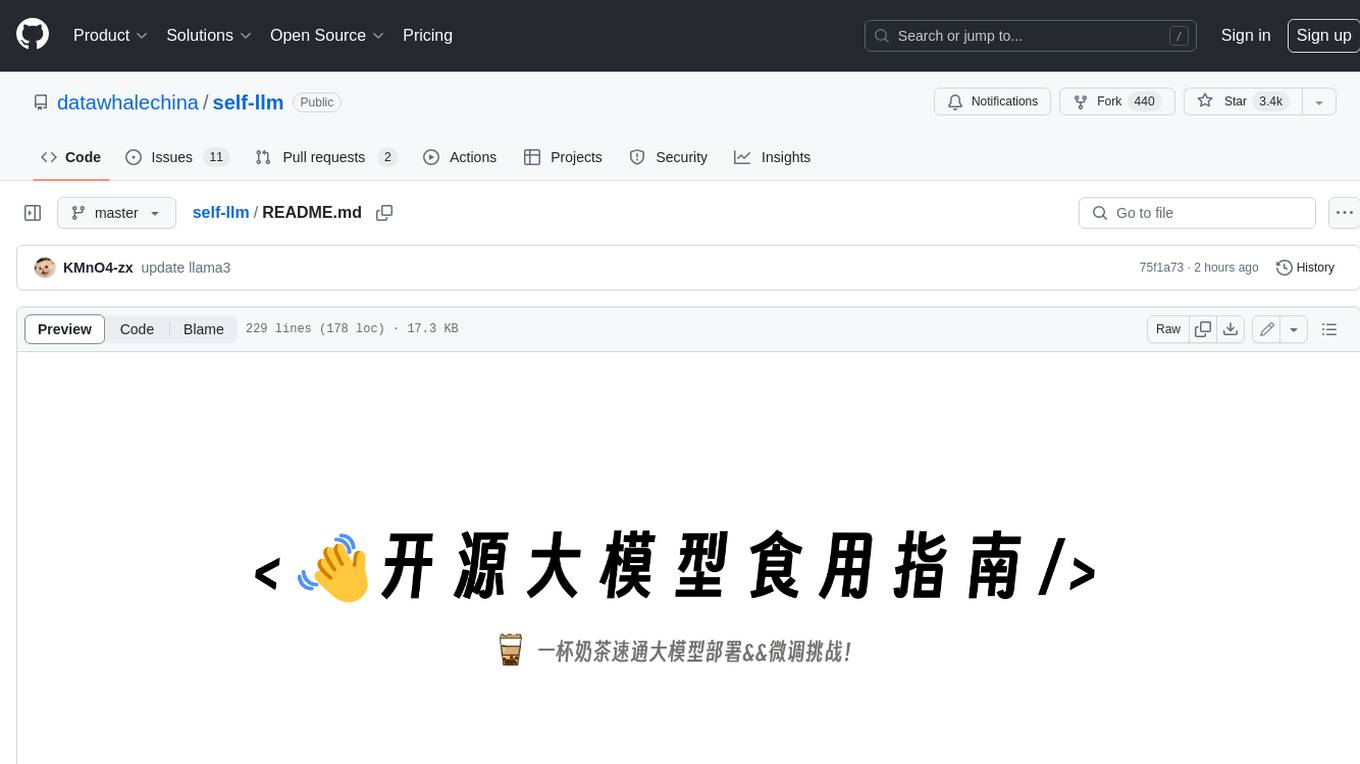
self-llm
This project is a Chinese tutorial for domestic beginners based on the AutoDL platform, providing full-process guidance for various open-source large models, including environment configuration, local deployment, and efficient fine-tuning. It simplifies the deployment, use, and application process of open-source large models, enabling more ordinary students and researchers to better use open-source large models and helping open and free large models integrate into the lives of ordinary learners faster.
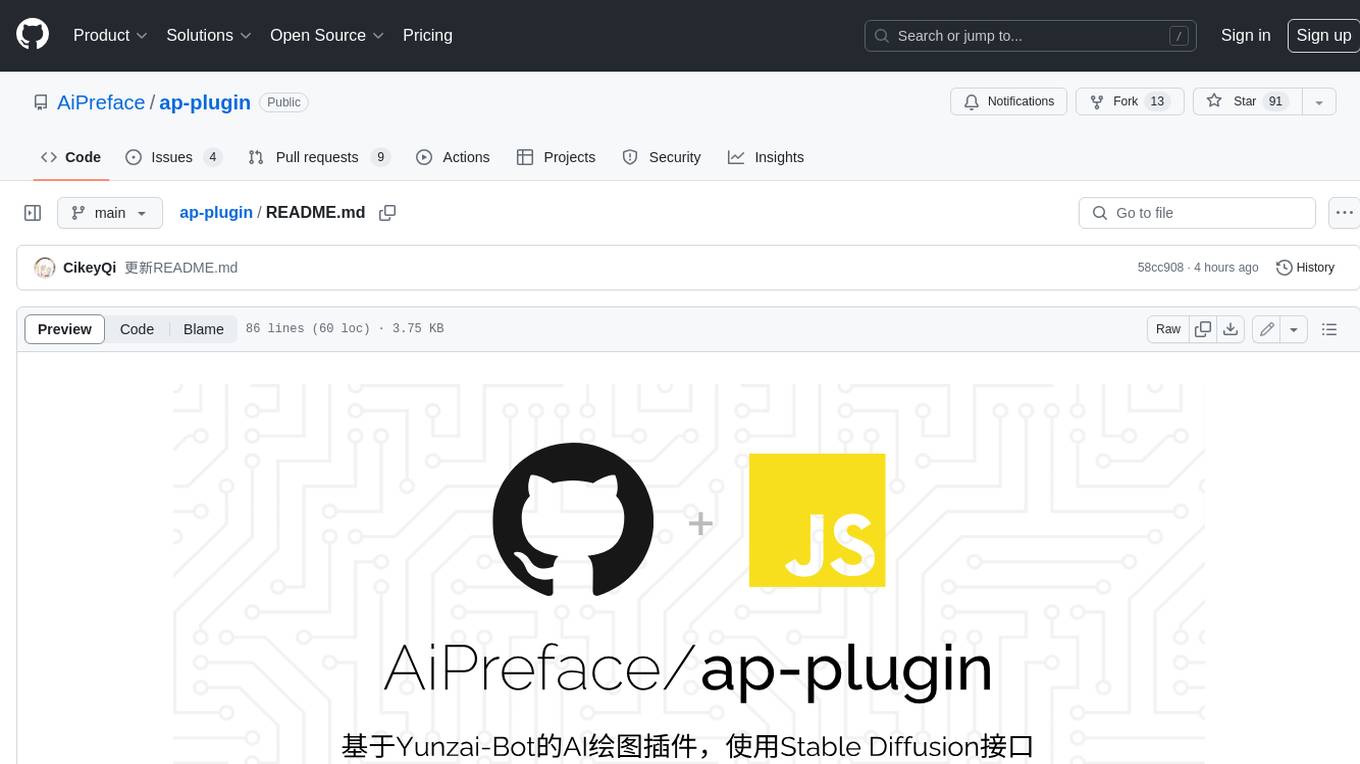
ap-plugin
AP-PLUGIN is an AI drawing plugin for the Yunzai series robot framework, allowing you to have a convenient AI drawing experience in the input box. It uses the open source Stable Diffusion web UI as the backend, deploys it for free, and generates a variety of images with richer functions.
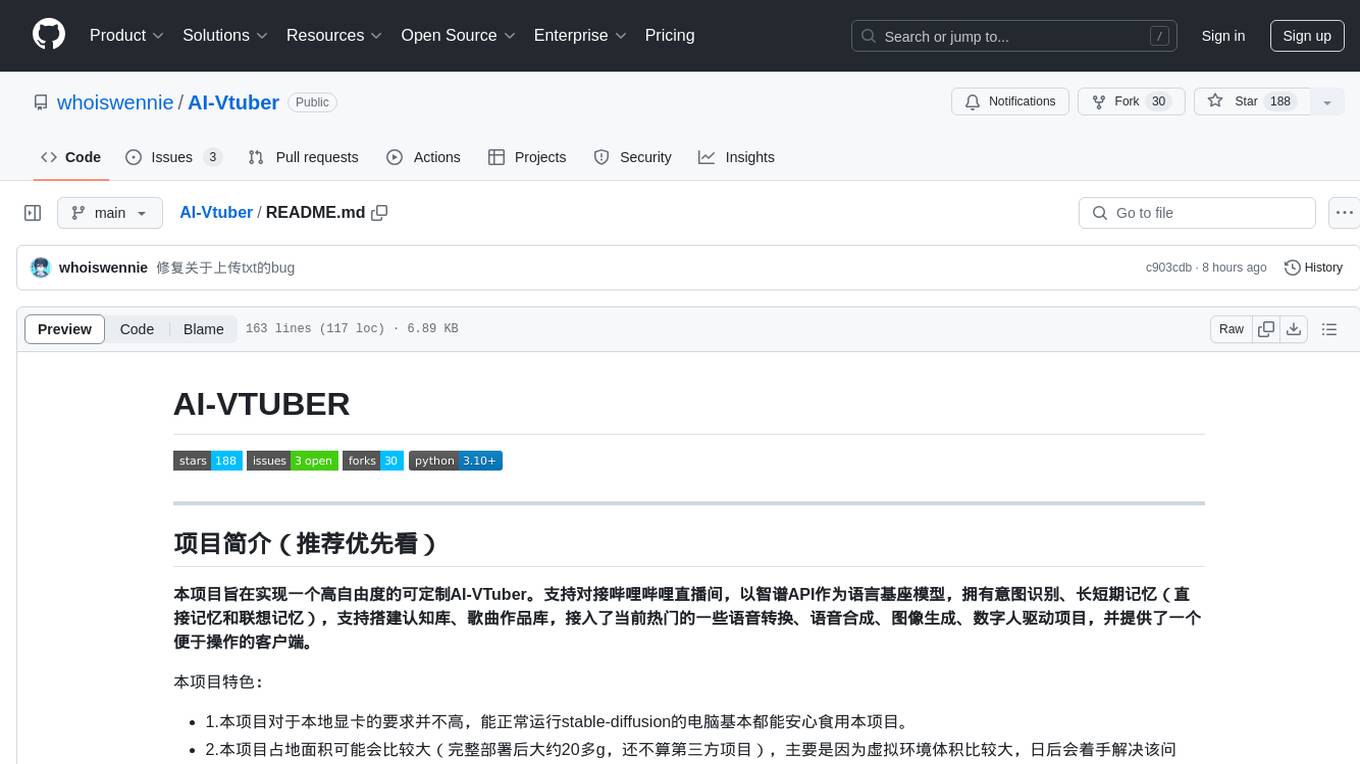
AI-Vtuber
AI-VTuber is a highly customizable AI VTuber project that integrates with Bilibili live streaming, uses Zhifu API as the language base model, and includes intent recognition, short-term and long-term memory, cognitive library building, song library creation, and integration with various voice conversion, voice synthesis, image generation, and digital human projects. It provides a user-friendly client for operations. The project supports virtual VTuber template construction, multi-person device template management, real-time switching of virtual VTuber templates, and offers various practical tools such as video/audio crawlers, voice recognition, voice separation, voice synthesis, voice conversion, AI drawing, and image background removal.
For similar tasks

do-research-in-AI
This repository is a collection of research lectures and experience sharing posts from frontline researchers in the field of AI. It aims to help individuals upgrade their research skills and knowledge through insightful talks and experiences shared by experts. The content covers various topics such as evaluating research papers, choosing research directions, research methodologies, and tips for writing high-quality scientific papers. The repository also includes discussions on academic career paths, research ethics, and the emotional aspects of research work. Overall, it serves as a valuable resource for individuals interested in advancing their research capabilities in the field of AI.
For similar jobs

Perplexica
Perplexica is an open-source AI-powered search engine that utilizes advanced machine learning algorithms to provide clear answers with sources cited. It offers various modes like Copilot Mode, Normal Mode, and Focus Modes for specific types of questions. Perplexica ensures up-to-date information by using SearxNG metasearch engine. It also features image and video search capabilities and upcoming features include finalizing Copilot Mode and adding Discover and History Saving features.

KULLM
KULLM (구름) is a Korean Large Language Model developed by Korea University NLP & AI Lab and HIAI Research Institute. It is based on the upstage/SOLAR-10.7B-v1.0 model and has been fine-tuned for instruction. The model has been trained on 8×A100 GPUs and is capable of generating responses in Korean language. KULLM exhibits hallucination and repetition phenomena due to its decoding strategy. Users should be cautious as the model may produce inaccurate or harmful results. Performance may vary in benchmarks without a fixed system prompt.
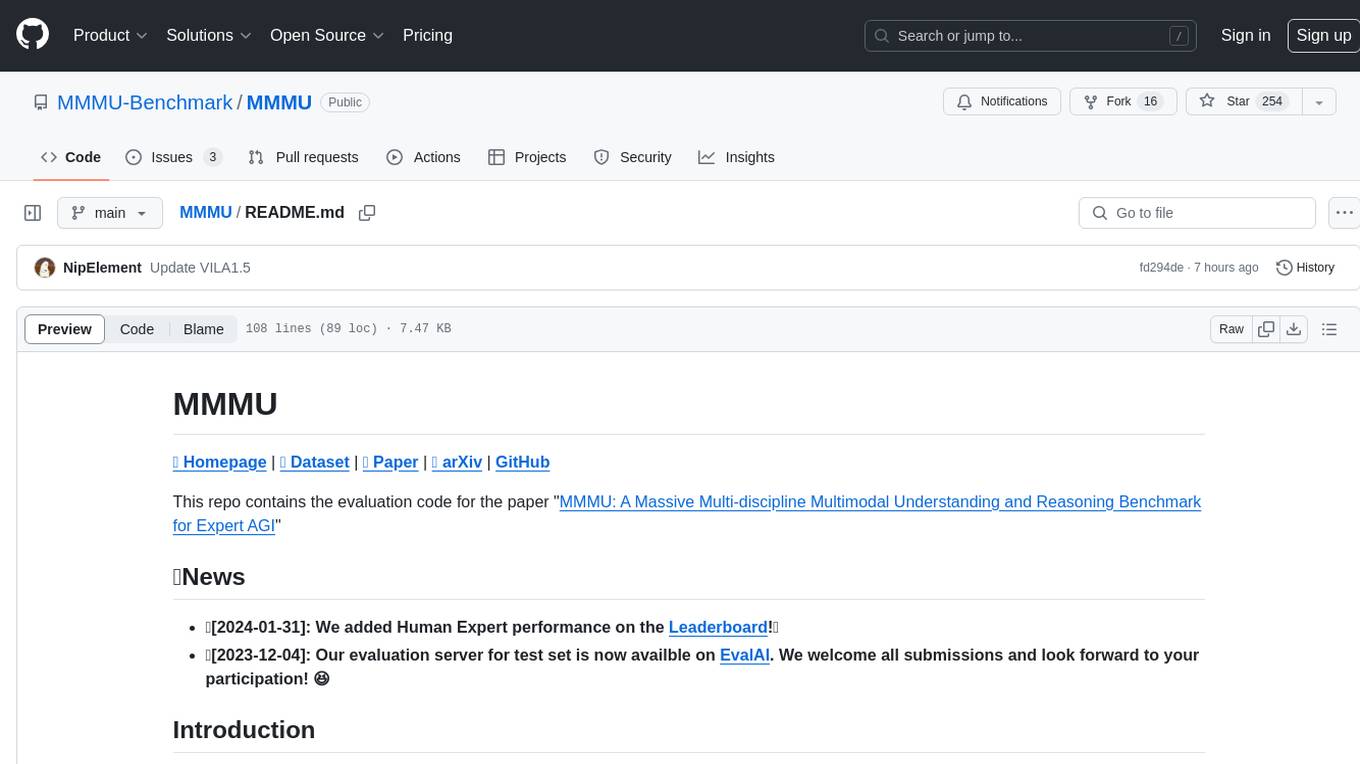
MMMU
MMMU is a benchmark designed to evaluate multimodal models on college-level subject knowledge tasks, covering 30 subjects and 183 subfields with 11.5K questions. It focuses on advanced perception and reasoning with domain-specific knowledge, challenging models to perform tasks akin to those faced by experts. The evaluation of various models highlights substantial challenges, with room for improvement to stimulate the community towards expert artificial general intelligence (AGI).

1filellm
1filellm is a command-line data aggregation tool designed for LLM ingestion. It aggregates and preprocesses data from various sources into a single text file, facilitating the creation of information-dense prompts for large language models. The tool supports automatic source type detection, handling of multiple file formats, web crawling functionality, integration with Sci-Hub for research paper downloads, text preprocessing, and token count reporting. Users can input local files, directories, GitHub repositories, pull requests, issues, ArXiv papers, YouTube transcripts, web pages, Sci-Hub papers via DOI or PMID. The tool provides uncompressed and compressed text outputs, with the uncompressed text automatically copied to the clipboard for easy pasting into LLMs.
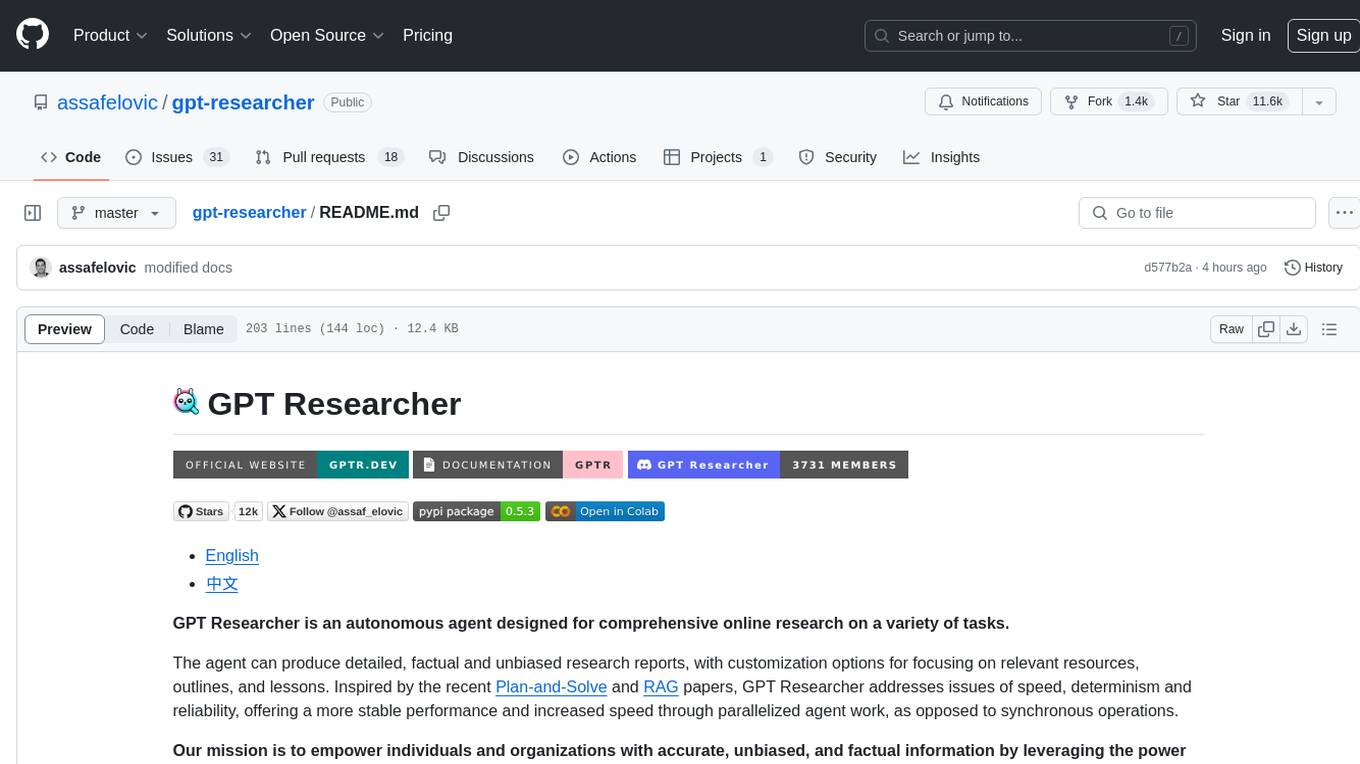
gpt-researcher
GPT Researcher is an autonomous agent designed for comprehensive online research on a variety of tasks. It can produce detailed, factual, and unbiased research reports with customization options. The tool addresses issues of speed, determinism, and reliability by leveraging parallelized agent work. The main idea involves running 'planner' and 'execution' agents to generate research questions, seek related information, and create research reports. GPT Researcher optimizes costs and completes tasks in around 3 minutes. Features include generating long research reports, aggregating web sources, an easy-to-use web interface, scraping web sources, and exporting reports to various formats.
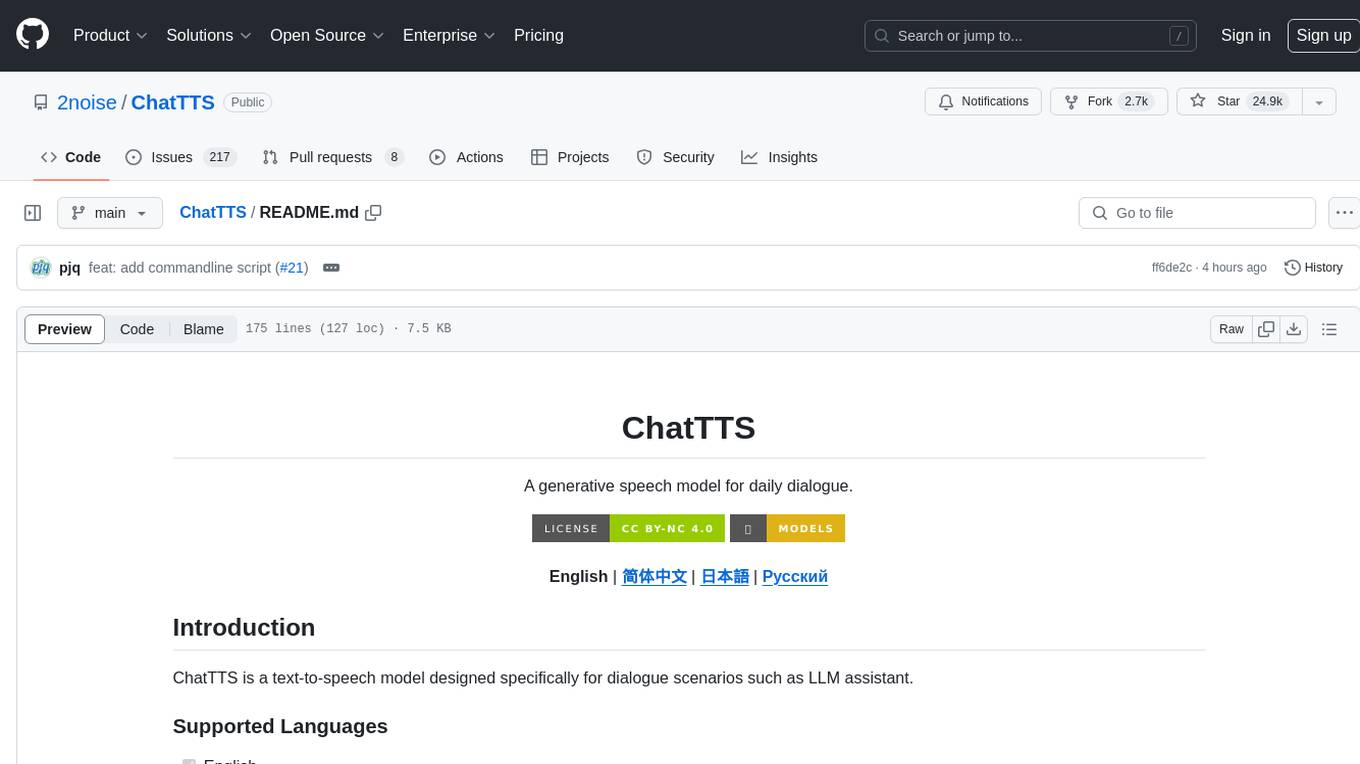
ChatTTS
ChatTTS is a generative speech model optimized for dialogue scenarios, providing natural and expressive speech synthesis with fine-grained control over prosodic features. It supports multiple speakers and surpasses most open-source TTS models in terms of prosody. The model is trained with 100,000+ hours of Chinese and English audio data, and the open-source version on HuggingFace is a 40,000-hour pre-trained model without SFT. The roadmap includes open-sourcing additional features like VQ encoder, multi-emotion control, and streaming audio generation. The tool is intended for academic and research use only, with precautions taken to limit potential misuse.
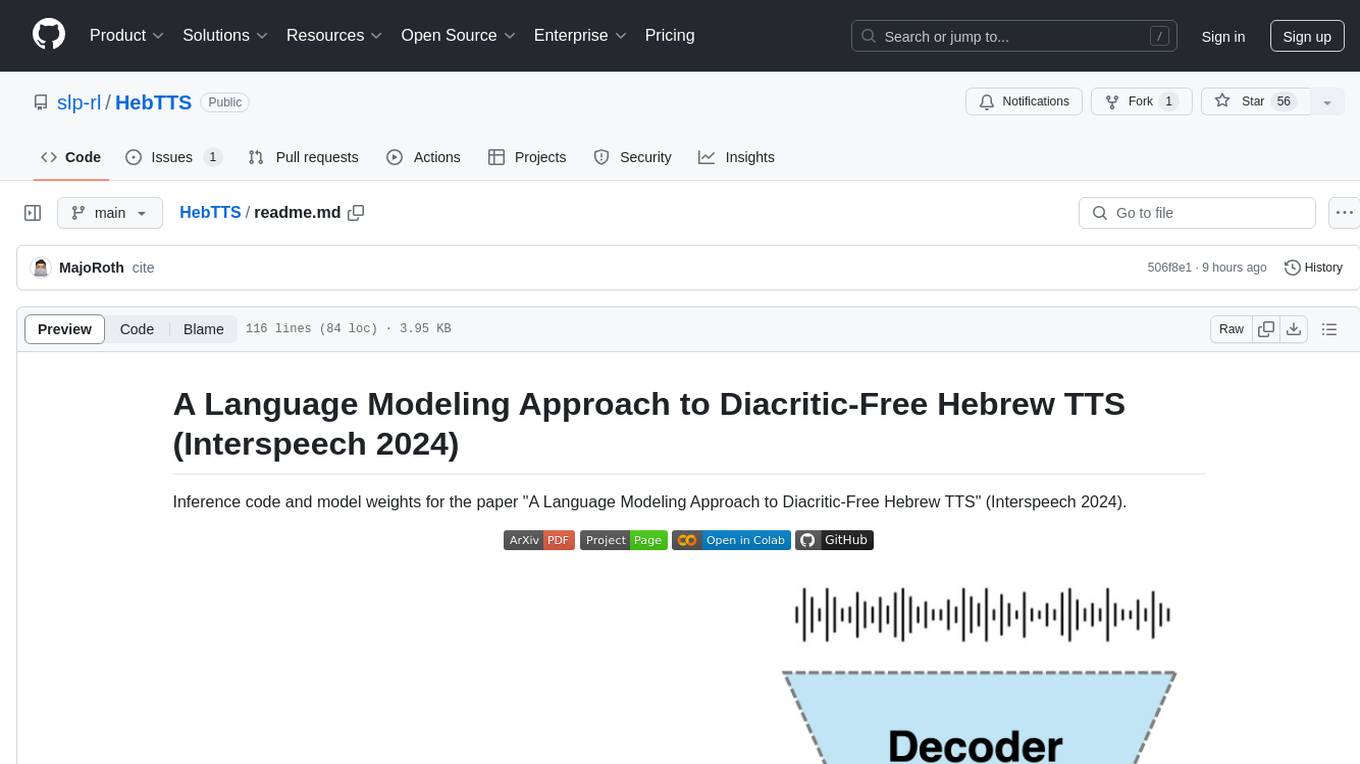
HebTTS
HebTTS is a language modeling approach to diacritic-free Hebrew text-to-speech (TTS) system. It addresses the challenge of accurately mapping text to speech in Hebrew by proposing a language model that operates on discrete speech representations and is conditioned on a word-piece tokenizer. The system is optimized using weakly supervised recordings and outperforms diacritic-based Hebrew TTS systems in terms of content preservation and naturalness of generated speech.

do-research-in-AI
This repository is a collection of research lectures and experience sharing posts from frontline researchers in the field of AI. It aims to help individuals upgrade their research skills and knowledge through insightful talks and experiences shared by experts. The content covers various topics such as evaluating research papers, choosing research directions, research methodologies, and tips for writing high-quality scientific papers. The repository also includes discussions on academic career paths, research ethics, and the emotional aspects of research work. Overall, it serves as a valuable resource for individuals interested in advancing their research capabilities in the field of AI.



